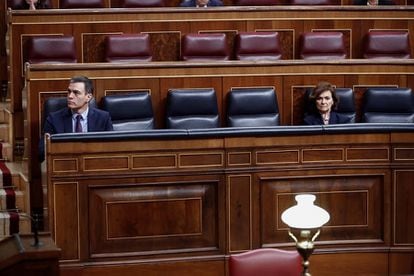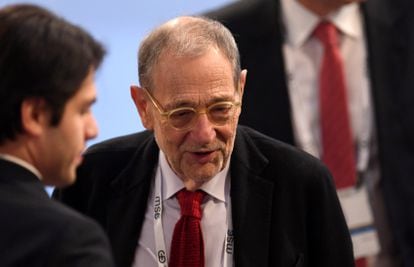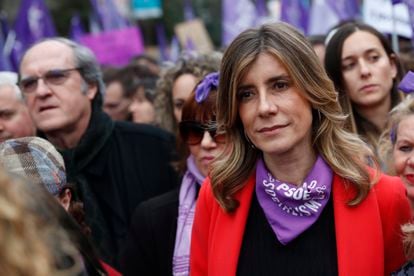The Spanish politicians in coronavirus quarantine
The SARS-CoV-2 virus has affected a large number of former and current public officials, forcing regional leaders and ministers to work in isolation
/cloudfront-eu-central-1.images.arcpublishing.com/prisa/JSRFSFL2D5FXLBSTPVR7T64L6A.jpg)

The novel coronavirus does not discriminate between ideology or levels of authority. It is just as likely to affect a plumber as a president, a communist as an ultranationalist. Spain is the perfect example of this: all political parties have registered cases of the SARS-CoV-2 coronavirus. Indeed, Spain’s political world has been hit hard by the virus. Two ministers, two regional leaders, the wife of the prime minister, the leader of the third-largest party in Congress, former politicians and several lawmakers and senators are fighting the coronavirus. Several of them have been admitted to hospital, others have recovered, while the majority have decided, in an act of responsibility, to continue working.
On Monday, Deputy Prime Minster Carmen Calvo was also admitted into hospital with respiratory problems and was waiting to be tested for the coronavirus.

“I hope I will overcome it. It is a very stubborn virus,” says Javier Solana by phone from hospital, where he was admitted 10 days ago. The 77-year-old, who was once the secretary general of NATO and the spokesperson of the Felipe González government, has one of the most serious cases of the virus among Spain’s political class. The politician, physicist and diplomat, who was the European Union’s high representative for foreign affairs and security policy, is recovering in the Ramón y Cajal hospital in Madrid after being in the Intensive Care Unit.
“The effort that health workers are making in all institutions is amazing. The level of care and commitment is touching,” he says with a tired voice.
Like Solana, the former deputy premier of the Madrid region, Esperanza Aguirre, 68, has also been admitted to hospital.
Solana is fighting against the coronavirus alone; the only visits he receives are from health workers. The isolation imposed on Covid-19 patients is a kind of double burden. He keeps the loneliness at bay reading the memoirs of Winston Churchill, writing down notes on his reflections and listening to music in the hospital room.

Solana has been shocked by the deadly impact of the coronavirus pandemic. “I still don’t know how to describe it,” he says. “What’s happening is truly formidable.
“It is a conflict against an enemy that cannot be recognized, and that has the power to spread its evil at very fast speeds. We have to defeat it collectively,” he adds.
Spain’s current politicians who have contracted the coronavirus have the added responsibility of managing the country. Most have continued to work quarantined in their homes, with security measures in place. The virus has affected the highest levels of public office: Spanish Cabinet, and La Moncloa, the official seat of government, and the home of Prime Minister Pedro Sánchez. The prime minister’s wife, Begoña Gómez, 45, has tested positive for the SARS-CoV-2 coronavirus.
Equality Minister Irene Montero, 32, has been wearing a face mask and gloves in her own home since March 12, when she announced that she had contracted the virus. These measures were taken so that she did not infect her three children, or her partner Pablo Iglesias, the leader of the anti-austerity party Unidas Podemos and one of Spain’s four deputy prime ministers. Montero’s symptoms have been mild, as is typically the case for people her age: a dry cough but no fever, according to people close to her. Iglesias did not test positive for the virus, even though he lives with Montero. The deputy prime minister was still required to remain in quarantine, which he broke twice – once to attend a Cabinet meeting to approve the declaration of a state of alarm, and another time to appear at a press conference in La Moncloa. But according to the government, Iglesias took precautions to avoid any possible contagions.

The minister of territorial policy, Carolina Darias, 54, also contracted the coronavirus, and has been recovering well at home. Spain’s Cabinet now only holds meetings via teleconference, which applies to all high-level meetings with the prime minister.
The leaders of the two regions hardest hit by the coronavirus outbreak – Madrid and Catalonia – have both tested positive for the virus. Both have continued to work. The regional leader of Madrid, Isabel Díaz Ayuso, 41, has been working in isolation from a hotel apartment. And in the Casa dels Canonges, the official residence of the Catalan premier, Quim Torra, 57, has been piloting the region’s response to the crisis solo.
On March 10, the secretary general of the far-right Vox party, Javier Ortega Smith, 51, became the first Spanish politician confirmed to have the virus. Since then, there has been a steady drip of contagions from the political arena.
Two days before he announced that he had tested positive for the coronavirus, Ortega Smith had attended a Vox rally in Vistalegre in Madrid, which was attended by around 9,000 people. There, he greeted and shook hands with many of the guests. After Ortega Smith, Vox leader Santiago Abascal, 43, and Vox deputy Macarena Olona, 40, also contracted the virus. The three are lawmakers in Spain’s lower house, the Congress of Deputies, where Popular Party (PP) lawmaker Ana Pastor, and the spokesperson for the Galician regional party En Marea, Antón Gómez Reino, 40, also tested positive.
Possible outbreaks
It is not difficult to trace possible sources of contagion. The two ministers, Montero and Darias, as well as Sánchez’s wife, attended the International Women’s Day marches on March 8. The three Vox lawmakers, who contracted the virus, were present at the party rally in Vistalegre.
Spain has an especially high number of affected politicians. In Italy, which has the highest number of coronavirus cases, the highest-profile politician to contract the virus was Nicola Zingaretti, the secretary general of the Democratic Party.
On Sunday, the German government announced that Chancellor Angela Merkel would be placed in quarantine after she came into contact with a doctor who tested positive for the coronavirus.

“I don’t know why politicians in Spain have been affected more. Perhaps it’s because of the physical contact. Every day you are kissing and hugging people,” says Edmundo Bal, 55, the parliamentary spokesperson for the center-right Ciudadanos, who has also contracted the coronavirus. He has thought about how he could have been infected: he had negotiated some amendments with Ortega Smith, he was at an event in tribute to the victims of the 2004 terrorist attack on Madrid’s Atocha train station on March 11, and he attended the International Women’s Day marches. “It’s impossible to know,” he says.
Another hypothesis is that politicians have been able to be tested for the coronavirus with greater ease than the rest of the population. Although, in fact, only government members were offered tests. Other lawmakers have not been given any privileged treatment, according to the speaker of Congress, Meritxell Batet. Deputies who wanted to be tested have either gone through the private healthcare system – such as the Vox lawmakers and Ana Pastor – or have gone without. Edmundo Bal, for instance, has experienced all the symptoms of the coronavirus but has not been able to get tested. “I didn’t insist because resources are scarce and I absolutely refuse to give the private health system money for doing the test,” he says. “Being a politician is not any privilege.”
English version by Melissa Kitson.
/cloudfront-eu-central-1.images.arcpublishing.com/prisa/GS7K242KQW263ZRFK3X22LJ73M.jpg)
/cloudfront-eu-central-1.images.arcpublishing.com/prisa/QQHHZKRJEVC2ZHJCBZT6I4HZOA.jpg)










































